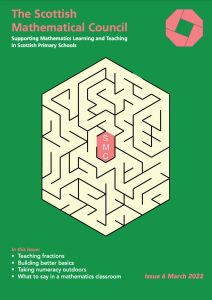The SMC Conference is back for another year!
See details below for information on the different range of sessions. Julie Brewer and I (Sarah Leakey) are very excited to be presenting some work related to subtraction. I’m also looking forward to attending other people’s presentations. There is plenty to choose from and I had a hard time choosing which sessions to go to as there was usually more than one in each block that I wanted to attend.
The great news is that there is also a discounted price if you are coming from Highland!
Only three weeks to go to the SMC Stirling Maths conference at the University of Stirling on Saturday 18th May. Ticket prices are unchanged from previous in-person conferences (£80 for a standard ticket; £20 for folk from Highlands and Islands; free for students).
Information about the workshops on offer here:
https://bit.ly/SMC2024workshops
Buy tickets and sign up for workshops here:
There are more primary-specific sessions than we have been able to offer in a long while, as well as a good range of sessions across ALL stages of mathematics education. Come and join the vibrant community of folk interested in numeracy and maths – you know you want to!
Ticket sales will close 12 midnight on Sunday 12th May.





